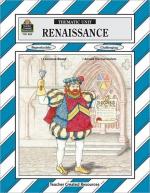|
This section contains 244 words (approx. 1 page at 300 words per page) |

|
Boethius, The Fundamentals of Music (500 C.E.)—This early medieval musical theory textbook remained indispensable to those who studied music as a branch of the mathematical sciences in the Renaissance. Boethius transmitted the ancient Pythagorean notion that proportionate intervals or musical harmonies underlay Creation and that music was thus a source for understanding natural laws.
Raffaele Brandolini, On Music and Poetry (1513)—This important humanist treatise opened up the possibility for music to be understood as a kin to poetry, rather than as a branch of mathematics.
Vincenzo Galilei, Dialogue on Ancient and Modern Music (1581)—This pathbreaking work argued that music's power derived, not from its mathematical relationship, but from the ear as it was trained to accept certain sounds and sensations. Galilei also promoted the monodic (single-lined) music of Greek Antiquity as the style that was most capable of stirring the emotions...
|
This section contains 244 words (approx. 1 page at 300 words per page) |

|



